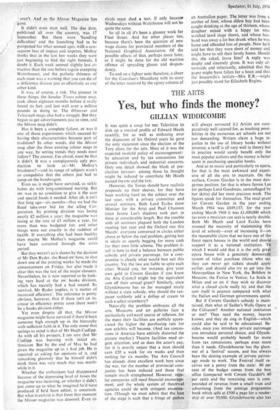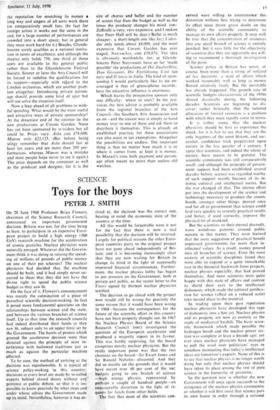THE ARTS
Yes, but who finds the money?
GILLIAN WIDDICOMBE
It was quite a coup for mac Television to dish up a musical profile of Edward Heath recently, for as well as enthusing over the diapasons of his Oxford years he gave the only statement since the election of the Tory plans for the arts. Most of it was the expected twofold policy of encouragement: by education and by tax concessions for private individuals and industrial concerns. Only one detail showed the blush of pre-
election fervour: among those he thought might be induced to contribute Mr Heath named the car and the TUC.
However, the Tories should have realistic proposals up their sleeves, for they have been working hard on the subject over the last year, with a private committee and several seminars. Both Lord Eccles (now Minister for the Arts) and Paul Channon (then Jennie Lee's shadow) took part in these at considerable length. But the trouble with all seminars plagued both the London meeting last year and the Oxford one this March: everyone conversed in circles either above or below the real problem, getting lost in ideals or openly begging for more cash for their own little scheme. The problem it- self is how to find a balance between public subsidy and private patronage, for a com- promise is clearly what would best suit this country. Yet the two are liable to spite each other. Would you, for instance, give your own gold to Covent Garden if you knew the Arts Council might lop the equivalent sum off their annual grant? Similarly, since Glyndebourne has so ,far managed nicely without a state subsidy, why should the tax- payer suddenly add a dollop of cream to such a select strawberry?
Naturally the problem embraces all the arts. Museums and art galleries face a particularly awkward source of inflation, for the more their facilities are publicly appre- ciated the higher the purchasing rate for new exhibits will become. (And tax conces- sions in America have entirely distorted the picture market.) Theatre facilities need ur- gent attention, and so does the actor's pay, for it is overtly unjust that a man should earn £20 a week for six weeks and then nothing for six months. The Arts Council has already done excellent work here since the war, for the number of provincial com- panies has been reduced and those that remain much strengthened. However, regu- lar companies still need financial encourage- ment, and the whole system of theatrical agencies could do with stringent examina- tion. (Though we must admit that the lure of the stage is such that a fringe of pathos will always surround it.) Artists are com- paratively well catered for, as teaching possi- bilities in the numerous art schools are not too demanding. Writers claim a huge in- justice in the use of library books without revenue; a tariff is all very well in theory but in practice would surely benefit only the most popular authors and the money is better spent in purchasing specialist books.
And so to music and particularly to opera, for that is the most awkward and expen- sive of all the arts to maintain. On the surface, Covent Garden is in the most dan- gerous position, for that is where Jennie Lee (or perhaps Lord Goodman, camouflaged by her skirts) did her most precious work. The figures speak for themselves. The total grant for Covent Garden in the year ending March 1964 was £849,137; for the year ending March 1968 it was £1,400,000 which (as even a musician can see) •is nearly double. Both Mr Heath and Lord Eccles have stressed the necessity of maintaining this level of subsidy—even of increasing it—on the reasonable claim that we have one of the finest opera houses in the world and should support it as a national institution. To which I would add that it is the only great opera house with a genuinely democratic system of ticket purchase (those who say they can never get tickets should apply earlier, and should also try to get into the Metropolitan in New York, the Bolshoy in Moscow, the Fenice in Venice, La Scala in Milan and so on if they wish to discover what a closed circle really is); and that the sum itself is peanuts compared with what the Italian and German governments spend.
But if Covent Garden's subsidy is main- tained, then what of Sadler's Wells Opera at the Coliseum? Another national institution or not? They need the money, heaven knows; and they do sings in English—which could also be said to be educational. Be- sides, once you introduce private patronage you introduce personal choice, and Glynde- bourne would probably benefit far more from tax concessions; 'perhaps even more than it needs. Glyndebourne has the glam- our of a 'festival' season, and has always been the shining example of private patron- age made to work. The Festival itself re- ceives not a penny from the state: 80 per cent of the budget comes from the box office (compared with Covent Garden's 40 per cent) and the remaining sum is com- pounded of revenue from a small trust and advertising from the prestige programme book which sells at £500 a page for a reader- ship of over 50,000. Glyndebourne also has
the reputation for stretching its money a long way and singers of all sorts work there for comparatively small fees. (In fact for foreign artists it works out the same in the end, for a large number of performances are crowded into a short space; but in general they must work hard for it.) Besides, Glynde- bourne surely qualifies as a national institu- tion in terms of excellence; and although the theatre only holds 750, one third of those seats are available to the general public rather than to the Glyndebourne Festival Society. Sooner or later the Arts Council will be forced to redefine the qualifications for its support—especially with reiard to the London orchestras, which are another prob- lem altogether. Introducing private patron- age should provide some kind of spur but will not solve the situation itself.
Now a leap ahead of all problems to wish- ful spending. What would be the most useful and attractive ways of private sponsorship? At the dreamiest end of the counter lie the new productions at Covent Garden. None has yet been sponsored by outsiders but all could be. Price-- vary. Aida cost £78,608; Manon only £22,123. (But before being stingy remember that Aida should last at least ten years and see more than 200 per- formances, whereas Manon was a mistake and most people hope never to see it again.) The price depends on the composer as well as the producer and designer, for it is the size of chorus and ballet and the number of scenes that fixes the budget as well as the times the producer changes his mind. (NB: Zeffirelli is very, very expensive, and I reckon that Peter Hall will be dear.)'Ballet is much cheaper: a short-length one like Jazz Calen- dar only needs about £8,000, and the most expensive that Covent Garden has ever staged, Nutcracker, cost £50,876. The idea is obviously worthwhile, for, at Glynde- bourne Peter Stuyvesant have so far 'made possible' the productions of Die Zauherflo►e, Don Giovanni, Die Entfiihrung, Cosi fan tut►e and 11 turco in Italia. The kind of spon- sorship I would particularly like to see en- couraged is that of gramophone records: here the educative influence is enormous.
Which leaves the prospective sponsor only one difficulty: where to start? In the pro- vinces the best advice is probably available from the regional branches of the Arts Council—the Southern Arts Association and so on—and the easiest way is simply to hand money over to one of these and ask them to distribute it themselves. This is already an established practice, for these associations can also assist in tax exemptions. Altogether the possibilities are endless. The important thing is that no matter how much it is or where it comes from, at least it is money. In Mozart's time both payment and patron- age often meant no more than useless old watches.































 Previous page
Previous page